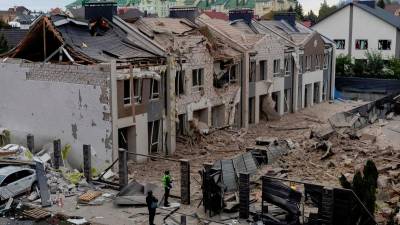LONDON: Ukraine has intensified strikes on Russian oil refineries and infrastructure with more than 30 attacks since early August to weaken Moscow’s war financing capabilities.
Russia remains the world’s third-largest crude oil producer and second-largest exporter with oil and gas revenues accounting for about 30% of its 2024 budget.
Kpler analyst Homayoun Falakshahi confirmed these attacks have been quite effective by reducing Russian refinery production rates by around 10%.
Moscow has responded to potential shortages by restricting petroleum product exports until year-end and extending its gasoline export ban.
Rystad Energy analyst Janiv Shah reported Russia’s refinery production dropped to 4.9 million barrels daily by mid-September, down approximately 400,000 barrels from early 2025.
The scarcity of Russian refined products has significantly widened the price gap between crude oil and processed fuels.
Russian consumers already face higher pump prices with retail gasoline costing 6.7% more by September 1 compared to late 2024 according to Rosstat statistics.
This price increase occurred despite a sharp decline in global crude oil prices during the same period.
Russia’s situation may worsen because damaged refineries typically require extended time to resume normal operations according to Shah.
Russian crude oil revenues face additional pressure from falling global prices as markets anticipate abundant future supplies.
SEB analyst Bjarne Schieldrop predicts the situation will likely become worse as Ukraine improves its refinery attack capabilities.
Schieldrop forecasts Russia may eventually halt all oil product exports while implementing domestic rationing measures.
US envoy Keith Kellogg has suggested Ukraine might conduct long-range strikes against Russia using American weapons.
Russia encounters difficult logistical problems when attempting to export crude oil originally destined for its damaged refineries.
The number of countries willing to increase Russian crude imports remains limited despite these production challenges.
Surrey Clean Energy director Adi Imsirovic stated international sanctions against Moscow are not working effectively.
Imsirovic explained delayed sanction implementation gave President Vladimir Putin time to build a parallel trading system.
Washington’s doubled tariffs on Indian products failed to curb New Delhi’s purchases of Russian crude oil.
Western oil companies withdrawing from Russia have considerably reduced investment in the nation’s energy infrastructure.
This investment decline limits Russia’s ability to increase crude output in coming years according to analysts.
Russia currently produces around 9.25 million barrels daily according to Falakshahi’s estimates.
The nation’s maximum production capacity stands at 9.45 million barrels daily compared to approximately 10 million before the war. – AFP
